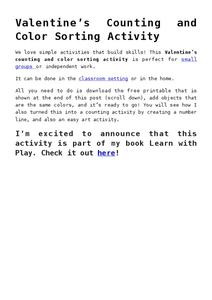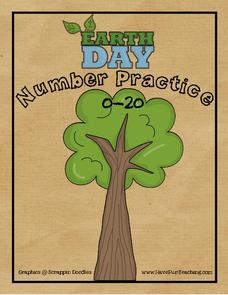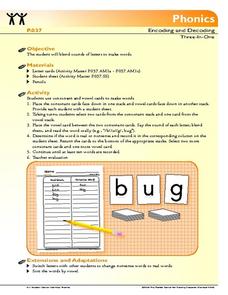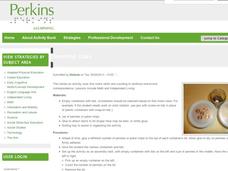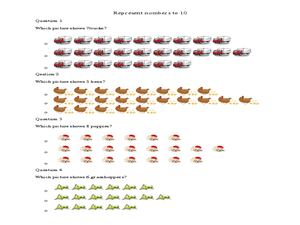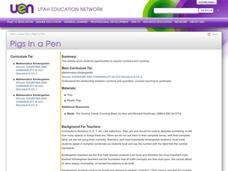Teaching 2 and 3 Year Olds
Valentine’s Counting and Color Sorting Activity
Reinforce the concept of one-to-one correspondence with a Valentine's Day-themed counting and color sorting activity. Scholars sort foam hearts by color—red, orange, yellow, green, blue, and purple—then count and place them on a number...
CK-12 Foundation
Inverse Functions: Definition of Inverse Functions
Is the inverse of a function also a function? Pupils manipulate the graph of a function to view its inverse to answer this question. Using a horizontal and vertical line, class members determine whether the initial function is...
Have Fun Teaching
Earth Day Number Practice 0-20
How many trees can your pupils plant? Practice numbers 0-20 with several related activities. For the first, kids match images of trees to numbers. They then match the number symbols to number words, using a word bank. The final activity...
Curated OER
One-to-one Correspondence
Learners count and keep track of objects using one-to-one correspondence. By moving, touching and pointing to objects they organize counting to determine the number in a set accurately. This helps students to practice the skill of...
Curated OER
Problem Solving Process: One-To-One Correspondence
First graders observe and demonstrate a variety of problem solving strategies to solve problems involving one-to-one correspondence and whole numbers to 100. They discuss the steps of the problem solving process, and solve a word...
K-5 Math Teaching Resources
Base Ten Cards (tens and ones)
Strengthen your class's understanding of place value with this series of base-ten flash cards. Including illustrations representing a variety of numbers from 13 to 94, this resource can be used in many different ways...
Florida Center for Reading Research
Phonics: Encoding and Decoding, Three-In-One
Scholars use the provided pack of alphabet cards to construct basic CVC words, then write down each word they make in one of two columns. Column one is for real words and column two is for nonsense words.
Perkins School for the Blind
Stuff, Seal and Stamp Mail
Have your class practice functional skills that can be applied to a wide variety of job opportunities. They will use a folding jig to help them fold, stuff, seal, stamp, and mail letters. Students with visual impairments will build...
Curated OER
Understanding 10: Backwards and Forwards
Help your young mathematicians completely master 10 by practicing one-to-one correspondence, number recognition, and recording numbers displayed. They make 10 with groups of two-different colored cubes and color in 10-frames to show how...
Curated OER
Concept Application: One to One Correspondence of Objects
Students consider the comparative sizes of the planets in the solar system. In this scale lesson, students select balls of different sizes to represent the planets in the solar system.
Perkins School for the Blind
Counting Cups
Teach one-to-one correspondence, fine motor, and counting skills to your learners with visual disabilities. Included are a set of activity suggestions, which are useful when teaching a variety of different early math skills. Braille,...
Curated OER
Count the Pictures: Numbers to 10
Help your young learners master 1:1 correspondence by counting pictured objects, and to communicate answers in multiple choice format. Given a number, they choose which of 3 rows of objects is the correct match. Four opportunities to...
Texas Center for Learning Disabilities
Teacher Templates
Letter by letter, sound by sound, monitor the growth of your emergent readers with these assessment templates. Adaptable to the needs of individual students, these one-on-one assessments focus on children's ability to identify...
Curated OER
Grab a Handful and Count
Let's use Fruit Loops to teach counting skills! Students practice counting one-to-one correspondence using Fruit Loops with a partner and then compare them to see who has more or less.
Curated OER
Pigs in a Pen
Kindergarteners explore numbers, counting, and one-to-one correspondence. Through demonstrations and hands on activities using math manipulatives, they discover several number concepts as well as practice counting throught rote...
Curated OER
Odd One Out
Which word doesn't rhyme? As they practice vowel-sound recognition, scholars examine rows of familiar objects to determine which object doesn't rhyme. There are four rows here, each with a beginning image and three subsequent images....
K-5 Math Teaching Resources
Ten Frame
Engage young mathematicians in building their number sense with this set of ten frame printables. Whether you're teaching pupils how to count, add, or subtract, these tools offer children tremendous support with...
Florida Center for Reading Research
Phonics: Letter-Sound Correspondence, Letter-Sound Match
Boost initial, medial, and final sound correspondence. Scholars practice decomposing word sounds using image cards and a worksheet. Learners cut out 10 three-letter images, sound them out, and glue them on the worksheet. Each word is...
Florida Center for Reading Research
Fluency: Letter-Sound Correspondence, Make a Match
A memory activity engages young learners in letter-sound correspondence. Pairs take turns examining two sets of cards lying face down. They flip one image card and one letter card, then name the initial sound. If the sounds match, pupils...
Florida Center for Reading Research
Fluency: Letter-Sound Correspondence, Letter Flash
Scholars work in pairs to drill and practice alphabet sounds, keeping track of their progress on a chart. Working one at a time, each partner flips letter cards, saying the sound and letter. If they get it correct, it goes in the YES...
Florida Center for Reading Research
Fluency: Letter-Sound Correspondence, Letter-Sound Mix-Up
Scholars time each other as they work through a sheet of all 26 letters. They test each other to see how many letters sounds they can identify in one minute.
Florida Center for Reading Research
Phonics: Letter-Sound Correspondence,
What a fun way to practice medial sound-letter correspondence! This alphabet activity has pupils flip cards, determine the medial sound, and place it on one of the train cars if it matches.
Florida Center for Reading Research
Fluency, Letter-Sound Correspondence, Make a Match
An activity tests the fluency skills of young readers. Scholars match initial sound cards to letter cards. Pairs take turns and work to locate the most matches before the timer goes off. The activity ends with a peer evaluation.
Curated OER
One of Our Five Senses - Touch
The wonderful world of Oobleck is entered in order to awaken your learner's sense of touch! As a warm up, learners put their hands in mystery bags in order to identify things that are wet, dry, hot, cold, hard, soft, rough, and smooth....


